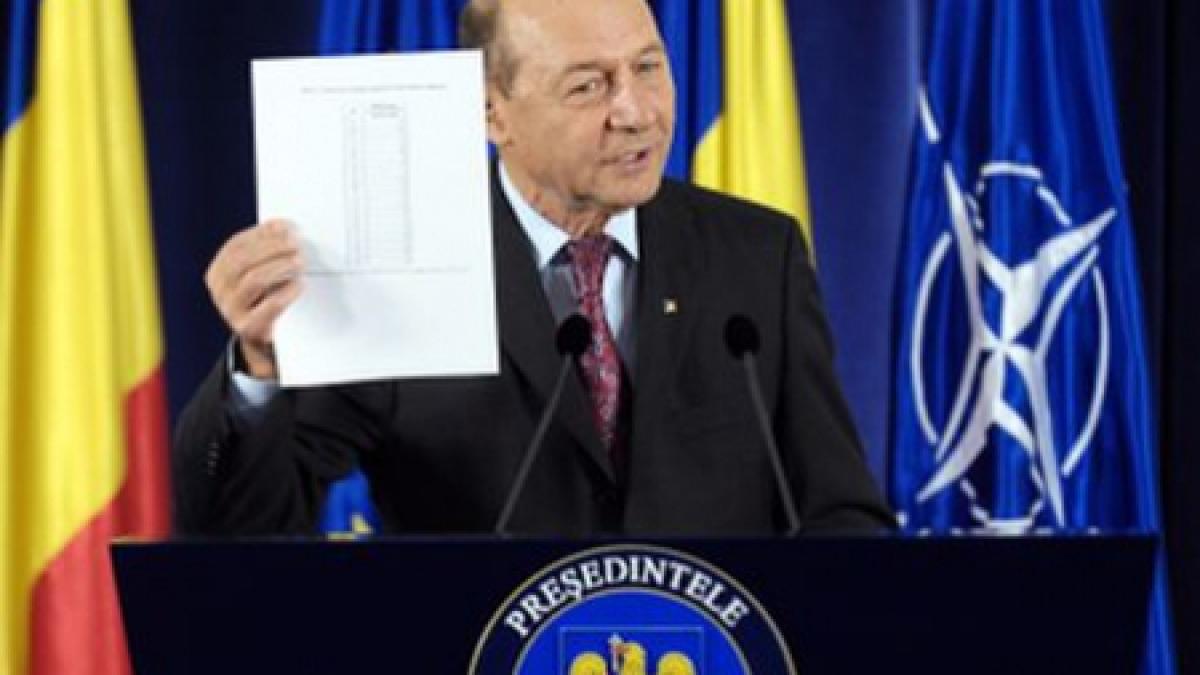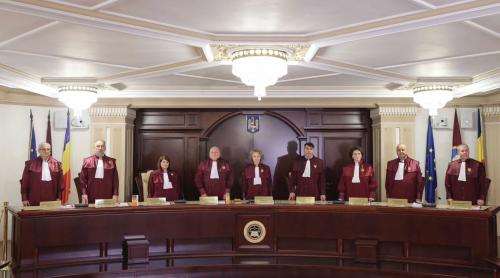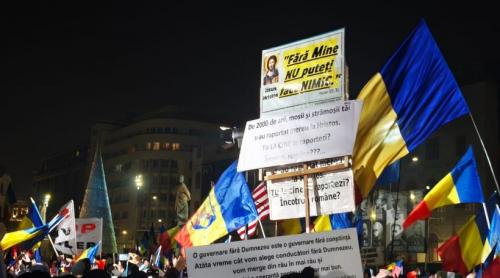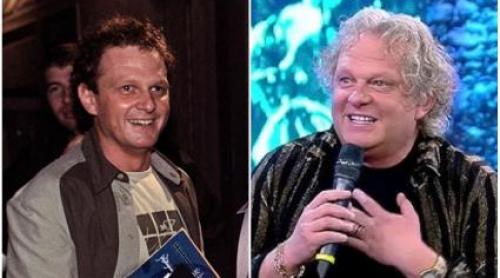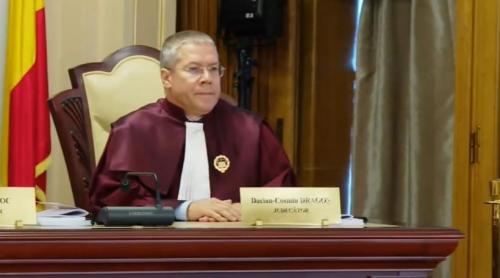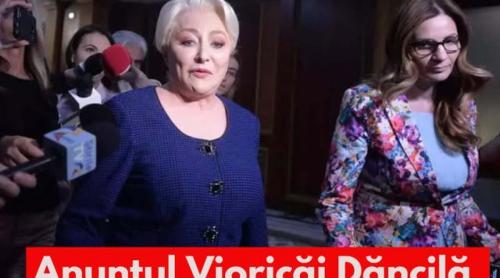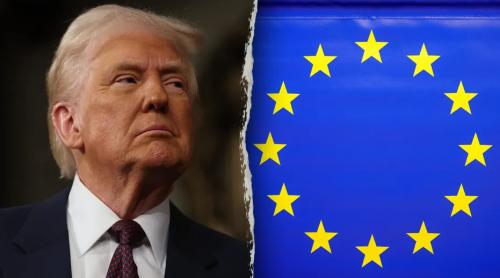
"Given the situation of cohabitation between the elected President of Romania, Mr. Traian Basescu and Prime Minister, Mr. Victor Ponta, the present agreement is convened to create the functional mechanism of cohabitation and ensure the effective governance of the country. The Institutional Cooperation Agreement is intended to preserve the country's stability and ensure the operational environment of a good governance as well as to assure international market confidence by harmonizing common positions within the executive powers, observing the constitutional powers of the President and of the Government of Romania.
1. Principles and values
The Institutional collaboration is based on the fundamental elements accepted by all parties, items that will not be altered directly or indirectly by any initiative of the parties as follows:
• The strategic target of Romania: Romania's NATO membership and EU Strategic Partnership with the U.S., EU rules of competition and market economy and democracy are intangible.
• Romania's security, including the sustainability of the institutions responsible are elements on which the parties shall not act in contradiction. Any reference or issue related to these institutions will be discussed together, an important role pertaining to professional arguments from the assessment of the institutions concerned .
• Justice independence and supremacy of the law and of the rule of law
a. the respect for constitutional values and the fundamental institutions of the state, starting with the justice, which must not be attacked and thus de-legitimized.
b. strengthening judicial independence against political influence. The compliance with the Constitution regarding the issue of emergency ordinances and the implementation of Constitutional Court decisions.
c. ensure the functionality of the affected institutions and warranty identification to maintain the responsibilities of the institutions under the rule of law
d. the appointment as Ombudsman of a person who has the support of various parliamentary groups.
e. the introduction of a transparent process for the appointment of the Attorney General and the Chief Prosecutor of DNA which should involve open applications, professional experience criteria , integrity and positive results in the anticorruption action.
• Romania's defense priorities: both parties agree to support the priorities of Romania's defense and space them out of political disputes, taking into account the needs and the options of professionals on various topics related to the Armed Forces. Politicians will refrain from taking a position that could impair the credibility, the capacity and the force of the Romanian Army.
• orientation towards the deepening of European integration: towards the EU development policies and promote Romania as an active member in achieving a general agreement in the EU to advance the European integration process is one of the basic common principles of the parties in addressing the scope of European Affairs
2. Shared engagements
The parties agree that they will comply and will refrain from launching into political disputes on issues related to Romania's commitments to international institutions. Also, they undertake to abide by a set of rules in their relations with external partners. Therefore:
• The parties undertake to refrain from attacks on state institutions of the rule of law and of those involved in foreign commitments, of financial or political nature, choosing to cooperate regarding common positions before the IMF BM, World Bank, Council of Europe, NATO, MCV, Schengen etc.
• The parties commit to maintain the accuracy of the external message;
• All the components of the Romania’s governance assumes the accuracy of the internal message on the topics convened.
• The parties shall define the areas of competition policy concretely, the elements which were not and agreed upon through direct negotiation on which divergent opinions would be offered as options in public.
• Parties undertake to avoid unnecessary public confrontation, to seek to resolve their differences on the issues on which they did not agree during consultations, respect the expertise of one party convened in the typology of the issues approached and to propose alternatives where differences in approach arise and the topics display publicly are not able to harm nationwide, but only debate the options for improving and increasing public consultation on these issues.
• Parties agree on the need to consult the ex-ante regarding the mandates aimed at developing / implementing European policies: Consultation meetings to harmonize common positions will take place before the ordinary meetings of the EU Council and the European Council, and whenever necessary (during meetings with exceptional character). If the case of general mandates or complex issues of great sensitivity, the parties agree to conduct consultations with the President, on the one hand and the political parties in the governance coalition / Parliament, on the other hand.
Romania's national interest objective in this period is the absorption of the European funds by making full use of available EU funds for Technical Assistance (OPTA).
3. Prevalent responsibilities areas
The parties agree that, under the Constitution of Romania, each component has prevalent responsibilities in their activity fields:
President: foreign policy, security, defense, representation at the European Council according to the CCR Decision.
Prime Minister: Economic and social governance of the country, current issues which do not involve national security, external relations at European and intergovernmental levels.
The Parties agree to respect the positions expressed by the constitutionally responsible, to cooperate in policy development where the second part is involved, in good faith, to avoid any dead ends, discuss and debate alternative positions. In these areas, divergent or alternative public positions will be expressed at a technical level, with direct reference to the arguments under this agreement and not political approached.
The Parties undertake to continue the practice of representation mandates approved by the President of Romania and the reports submission upon arrival from delegations.
4. Cooperation areas and cooperation means
There are effective areas where cooperation between the two parties of the executive is required. There is already a set of institutional mechanisms and administrative case law to be maintained. Therefore, each party will respect the other party’s duties and positions in the administrative decision papers which involve both parties, in good faith, avoiding dead ends, but with respect towards every parties arguments, which could pertain to an unacceptable sphere for the other party. If different views occur, the final decider’s prevails.
Under this topic, are registered:
- elaboration of foreign policy and the cooperation with MFA and Ministry of European Affairs
- generals appointment
- Ambassador’s appointment
- the appointment of the Attorney General, Chief Prosecutor of DNA or other functions that require the constitutional powers of the President and the Government's
- the elaboration of common positions on third themes
The cooperation means, in these cases, are accomplished either by direct decision-making upon the meeting of those concerned - President with Prime Minister, Minister of Foreign Affairs, Defense Minister, other ministers - or through institutional formulas to agree a common position - external mandate for MFA to negotiate with the Department of Foreign Affairs and the respective advisor for the mandate of the European Council issued by the MFA and MAEur with specialized counsel or by third formula agreed by both policy makers to work in this direction.
Essential legislation to be implemented (any changes the parties to consent upon):
- 4 justice codes
- The law of the small justice reform
Commitment to pass the following laws:
- The new Health Law
- Administrative reorganization - regionalization
- Electoral reform
- constitution’s review
5. General code of conduct
Parties will embrace minimal rules to address each other respectfully with direct reference to the position of the partner’s addressing each other politely in the second person on plural and will sanction excess behavior and the public outings of their party colleagues or of their employees who exceed this rule of behavior, common sense, decency and politeness.
The parties also undertake to avoid harsh expressions and attacks of any kind. They shall refrain from publicly exposing un-discussed issues and will agree concrete terms, assuming the speed in discussing the topics requested by a party or the other and formulating responses and positions. Upon the expiry of the deadlines agreed, the public approach of the issues and putting them up for debate it an open option.
The Parties agree to strictly observe the rule not to publicly expose official talks and publicly announce only elements agreed by both parties or issues on which there is agreement and whose exposure to public space does not affect the interests of Romania.
6. Decision making mechanism
The decision making formula between the two components of the Executive, the Presidency and the Romanian Government resides primarily in the meeting or the direct discussion President _Premier. Exceptionally, other persons could be involved, with the prior acceptance of the two, or a topic could be delegated to the administrative system of the two institutions – advisers, technical staff. There can be issues that require the involvement of the two presidents of the Chambers as there can also exist debate and decisions groups that involve other ministers too.
7. The disputes settlement mechanism
Under the circumstances where on a certain topic where convergence of both parties is necessary, there is no constitutional provision regarding any parties decision prevalence or they are extremely important matters and a common position cannot be agreed upon, as well as when the rules of the current agreement are being breached, the settlement must be done through a mechanism agreed upon that would ensure reaching a solution to unblock the relation and it functionality.
The dispute resolution mechanism consists of advisers and ministers, with a person assigned by each party to lead each component. The assignment will be made according to the topic discussed, and controversial or unacceptable persons should be avoided. The issue is approached from a technical and legal perspective , options will be chosen. The discussion within the mechanism are not public not meant to be published unless the two decision makers agree over the final wording agree thereof, Mediafx reports.
Ponta explained why he had signed the agreement with the President: "A political crisis in Romania now would be a very bad thing"
Ştiri video recomandate

